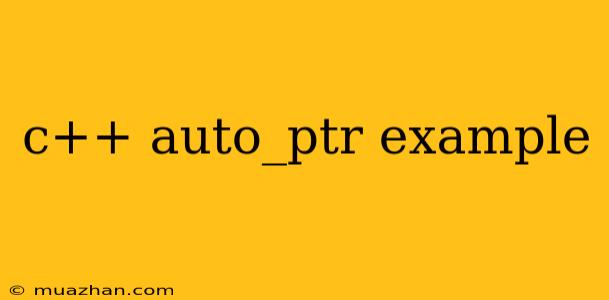C++ auto_ptr Example
The auto_ptr is a smart pointer class in C++ that automatically manages the lifetime of dynamically allocated objects. It provides ownership semantics, ensuring that the object is deleted when the auto_ptr goes out of scope. However, it is considered deprecated in C++11 and later due to its potential for unexpected behavior and memory leaks.
Here's a simple example demonstrating how to use auto_ptr:
#include
#include
using namespace std;
class MyClass {
public:
MyClass() {
cout << "MyClass constructor called" << endl;
}
~MyClass() {
cout << "MyClass destructor called" << endl;
}
void printMessage() {
cout << "Hello from MyClass!" << endl;
}
};
int main() {
// Create an auto_ptr pointing to a new MyClass object
auto_ptr myObject(new MyClass);
// Access the object through the auto_ptr
myObject->printMessage();
// Transfer ownership to another auto_ptr
auto_ptr anotherObject = myObject;
// Access the object through the new auto_ptr
anotherObject->printMessage();
// The original auto_ptr myObject is now empty and does not manage the object
// myObject->printMessage(); // This would cause an error
return 0;
}
Explanation:
- Include
<memory>: This header file contains the definition ofauto_ptr. - Create an
auto_ptr: The lineauto_ptr<MyClass> myObject(new MyClass);creates anauto_ptrnamedmyObjectthat points to a newly created object of theMyClasstype. Thenewoperator dynamically allocates memory for the object. - Access the object: You can access the object using the
->operator. - Transfer ownership: The line
auto_ptr<MyClass> anotherObject = myObject;transfers ownership of the managed object frommyObjecttoanotherObject. After the transfer,myObjectbecomes empty.
Important Considerations:
- Ownership semantics:
auto_ptrimplements single ownership. Only oneauto_ptrcan own a given object at a time. If you try to copy anauto_ptr, ownership is transferred to the newauto_ptr, leaving the originalauto_ptrempty. - Resource management:
auto_ptrautomatically calls the destructor of the managed object when it goes out of scope. This ensures that the object's resources are released properly. - Deprecation: As mentioned,
auto_ptris deprecated in C++11 and later. Useunique_ptrinstead, which provides similar functionality with safer and more robust memory management.
Alternatives to auto_ptr:
unique_ptr: A more modern and safer alternative toauto_ptr. It provides exclusive ownership and is the preferred choice for managing dynamically allocated objects.shared_ptr: Allows multiple pointers to share ownership of a single object. This is useful for managing objects that need to be accessed by multiple parts of your code.
For more robust and efficient memory management, consider using unique_ptr and shared_ptr instead of auto_ptr.
